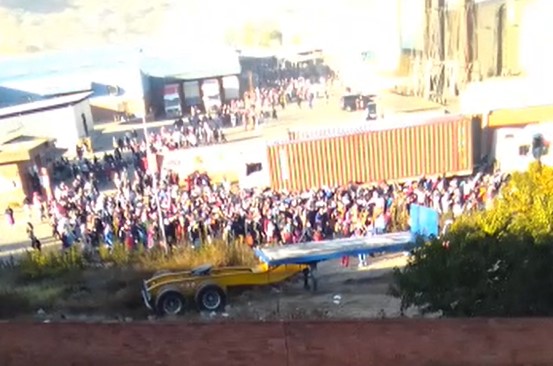
May 19, 2021
In a demonstration of Lesotho’s widely reported troubled human rights record, peacefully protesting garment workers rallying since Friday for two promised, but indefinitely delayed, minimum wage increases were met on Monday in the capital, Maseru, and surrounding areas with police violence and intimidation.
“Eight workers today were hospitalized after being shot at with rubber bullets and—in one instance—live rounds,” reported National Clothing Textile and Allied Workers Union (NACTWU) General Secretary Sam Mokhele to the Solidarity Center.
Unions say the government deployed special forces, with police shooting 12 people—including two children, ages 7 and 9—in Maputsoe and Maseru, and beating and arresting others.
“Our garment worker members, with whom we are already addressing rampant gender-based violence in their factories, want the world to know that their peaceful rallies in support of scheduled wage increases were met with outsize police violence,” says Independent Democratic Union of Lesotho (IDUL) Deputy General Secretary May Rathakan.
Lesotho’s unions, including garment workers, are imploring the government to make good on two missed incremental minimum wage increases—for 2020/2021 and 2021/2022—that were due to be implemented by government gazette publication on April 1 but have been delayed indefinitely.
“These acts had exposed the workers to absolute poverty because their current salaries cannot address their needs,” says United Textile Employees (UNITE) General Secretary Solong Senohe in a media statement.
Six private-sector Lesotho unions warned almost two weeks ago of a possible work stoppage starting last Friday should promised minimum wage increases continue to be delayed. In addition to IDUL, NACTWU and UNITE, the Construction, Mining and Quarry Trade Union (CMQ), Lentsoe La Sechaba Trade Union (LESWA) and the Lesotho Workers Association (LEWA) also protested.
Lesotho has a long history of human rights violations against political and labor activists, including police violence against peacefully striking factory workers rallying for fair wages last year. The 45th annual United States Department of State, Bureau of Democracy, Human Rights and Labor Human Rights report on Lesotho found that members of the Lesotho Mounted Police Service and Lesotho Defense Force last year committed numerous human rights abuses, including “unlawful or arbitrary killings; torture and cases of cruel, inhuman, or degrading treatment or punishment; harsh and life-threatening prison conditions [and] arbitrary arrest or detention.”
Solidarity Center Africa Regional Program Director Christopher Johnson says: “State violence in response to garment workers’ legitimate and peaceful demands for a livable minimum wage flies in the face of human rights norms.”
The right to strike has been enshrined in the constitutions of at least 90 countries and “has in effect become customary international law,” said UN rights expert and former UN Special Rapporteur on the rights to freedom of peaceful assembly and of association Maina Kiai in 2017, citing global and regional instruments that include ILO Convention No. 87 (Articles 3, 8 and 10), the International Covenant on Economic, Social and Cultural Rights (Article 8), the International Covenant on Civil and Political Rights (Article 22), the European Convention on Human Rights (Article 11), and the American Convention on Human Rights (Article 16).
May 17, 2021
A Kyiv mine worker rally protesting $71 million wage theft by state-owned coal-mining enterprises last week resulted in multiple concessions from the country’s Ministry of Energy. These included:
- Transferring more than $30 million on May 12 to state-owned coal mining companies’ accounts to pay back wages
- Directly paying back wages from the first three months of this year to non-industrial employees
- Committing to meeting regularly with the Independent Trade Union of Miners of Ukraine (NPGU) to strategize on the industry’s future
- Working with the Independent Trade Union of Miners of Ukraine (NPGU) to appropriately address low coal prices—including working toward a total ban on electricity and coal imports from Russia and Belarus, where oligarch control and failure to respect internationally accepted worker rights enables the low coal prices that are pushing Ukraine’s miners out of work.
“People who work in dangerous conditions, risk their lives every day and whose work depends on the country’s energy security must not be humiliated” said NPGU Chairperson Mykhailo Volynets during the rally.
The May 12 rally, which was located near Ukraine President Volodymyr Zelensky’s Kyiv office, brought together more than 500 mine workers from Donetsk, Luhansk, Lviv and Volyn. Protestors asserted Ukraine citizens’ constitutional right to renumeration for work performed, highlighted the difficult conditions for families of miners suffering wage theft and demanded postponement of labor-related draft laws that would eliminate labor and trade union rights. The rally follows on the heels on an 11-day protest last year over the same issues.
Energy Minister Herman Galushchenko said that, going forward, his ministry is committed to regular meetings with energy sector union leaders and miners to address long-term problems. “We are always open to dialogue and discussion of transformation concepts… But, for this, we need to work out mechanisms for constant normal communication,” he said.
In recognition of the Ministry of Energy’s concessions, NPGU suspended the protest. However, warned Volynets: “[T]he miners are ready to return with protests if the authorities, the government, the new Minister of Energy do not listen.”
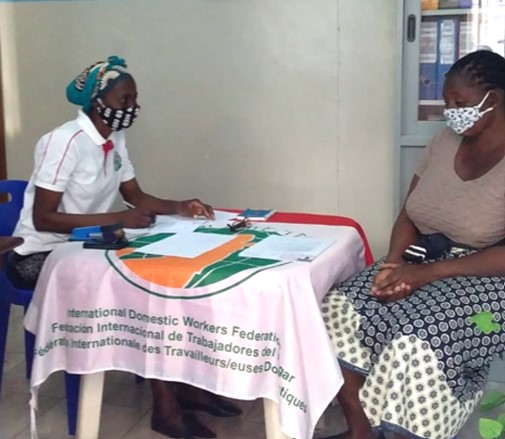
May 11, 2021
The International Domestic Workers Federation (IDWF) is urging more than 25 Africa-based affiliates to use the results of a new survey documenting the suffering of Africa’s domestic workers and their dependents during the pandemic to lobby their governments for urgent reform. Conducted by domestic workers with 3,419 of their peers in 14 African countries from November 2020 through January 2021, the survey found that only 17 percent of respondents received emergency income, food or other state-provided social support—and that most of that number received such support through another household member because they were not themselves eligible.
“It’s one thing to lose your job, it’s another thing to lose your job in a context where you don’t have access to unemployment benefits, social security or any income support,” says IDWF Lead Research Associate Louisa Acciari and post-doctoral researcher at the Federal University of Rio de Janeiro. “I think this is something where the unions can really campaign at the national level to get more inclusive social protection policies.”
Only 6 percent of those unable to work received employer-provided wages, while almost one-third of survey respondents were laid off—85 percent of whom were the main family breadwinner. They received no severance pay and remained out of work for up to six months. Nearly half of survey respondents suffered income reduction that had a dramatic impact on their household and was exacerbated by rising food and transportation costs.
During a recent event, IDWF leaders urged affiliates to use survey data in national campaigns lobbying their governments for inclusion of domestic workers in unemployment, health insurance, injury and illness compensation, and pension schemes, and for ratification of ILO Conventions ILO Conventions 189 on Domestic Workers and 190 on Violence and Harassment.
“Now we have an additional tool to fight until we get our rights, our social protections. People will remember what we say if they hear us saying [it] with numbers,” said IDWF General Secretary Elizabeth Tang.
More than 25 IDWF affiliates conducted peer-to-peer surveys in English, French, Portuguese and multiple local languages in Burkina Faso, Ethiopia, Guinea, Ivory Coast, Kenya, Malawi, Mozambique Namibia, Senegal, South Africa, Tanzania Togo, Uganda and Zambia.
“Through it all, the IDWF has shown the world that we are united,” said IDWF President and General Secretary of the South African Domestic Service and Allied Workers Union (SADSAWU). “There is much more to be done.”
Based on survey findings, IDWF recommendations include that governments:
- Conduct awareness-raising campaigns regarding occupational health and safety standards, worker rights and employer responsibilities
- Distribute personal protective equipment at key access points such as bus and taxi stands
- Introduce price controls
- Expand income-support measures to domestic workers
- Extend contributory social insurance to domestic workers
- Where absent, introduce contributory unemployment benefits for domestic workers
- Ratify ILO Conventions 189 and 190 and adopt complementary national legislation for implementing an appropriate enforcement framework
- Adopt legislative reforms to ensure effective expansion of social protection to domestic workers.
“The Impact of COVID-19 on Domestic Workers of Africa” survey is part of a global IDWF research project that includes Latin America and the Middle East and North Africa. Around the world, the pandemic has vastly widened gender, racial and economic divisions. CEOs have raked in record profits during the pandemic, and 8 of the 10 wealthiest people in the world have grown billions of dollars richer over the past year. On the other side, domestic workers, agricultural workers, trash collectors, street vendors and a growing number of gig workers employed through app-based services were recognized as essential over the last year and hailed as heroes, yet are among the most economically undervalued and underserved. The COVID-19 crisis cost women around the world at least $800 billion in lost income in 2020, equivalent to more than the combined GDP of 98 countries, said Oxfam last month.
The Solidarity Center partners with the IDWF around the world, supporting domestic workers’ efforts to access their rights. As of April 2021, the IDWF has 81 affiliates from 63 countries.
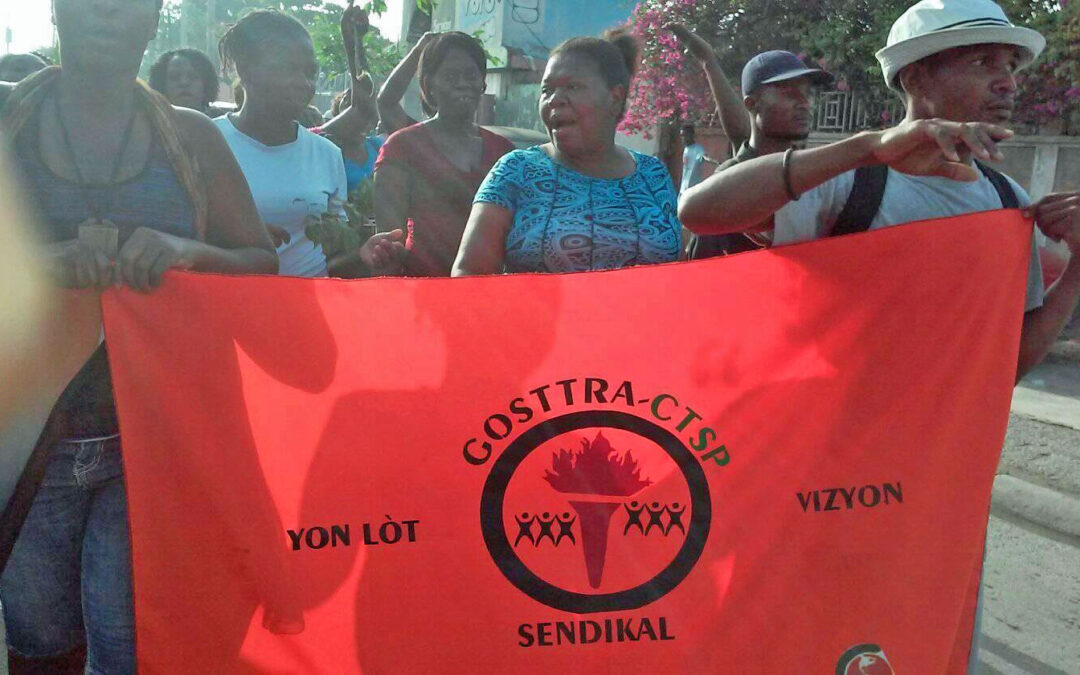
May 6, 2021
Garment workers and their union in Haiti are hailing a landmark settlement with a factory in Port-au-Prince that provided a total of $15,480 in back pay to 1,200 workers. The compensation covers 20 percent of the amount the employer deducted from workers’ paychecks for health care coverage by the government agency, OFATMA, but failed to pay to the agency. Haitian law requires employers to register workers in the system, deduct six percent of pay (split between employer and employee), and forward the contribution to OFATMA in a timely fashion.
The settlement follows the death of Liunel Pierre, a garment worker, who died in July 2020 after being denied life-sustaining dialysis treatment due to a lack of accrued health care funds.
After Pierre’s death, the Association of Textile Workers Unions for Re-importation (GOSTTRA) demanded the employer immediately remedy its failure to contribute to workers’ health insurance. After a weeks-long work stoppage, GOSTTRA members successfully brought management to the table. The settlement also covers many workers laid off during the pandemic and GOSTTRA is working with the employer to establish processes to contact the laid-off workers so they can receive the reimbursement.
Union advocates say this is the first time a Haitian garment sector union successfully negotiated a financial settlement agreement on behalf of workers and is holding the employer accountable without international or fashion brand intervention.
With Solidarity Center support, GOSTTRA printed fliers to publicize the settlement among workers that detailed the payment they should receive, accompanied by megaphone announcements at the factory. GOSTTRA is monitoring management’s action to ensure it correctly reimburses the workers.
Few factories in Haiti make the required contributions to the health or pension funds in accordance with the law, threatening the ability of workers to access health care. The International Labor Organization (ILO)’s Better Work Haiti (BWH) has reported continuous and widespread noncompliance for 10 years. In its most recent report, BWH found that 84 percent of employers did not comply with legal requirements for social benefits between October 2019 and September 2020.
In the same month as Pierre’s death, another garment worker, Sandra René, died from pregnancy complications after she also was turned away from the hospital where she sought medical care. As in Pierre’s case, the factory had deducted funds from her paycheck for health coverage, but failed to consistently pay into the system. Hundreds of garment workers marched with René’s casket in a funeral procession to OFATMA offices to protest her death.
Little Job Security for Garment Workers in COVID-19
GOSTTRA’s success comes as Haiti’s textile industry struggles to recover from diminished demand during the COVID-19 crisis. Workers still face layoffs and reduced working hours, with roughly a third of the 57,000 workers in the country’s garment industry suspended or terminated. Increasing violence in the country threatens workers’ ability to safely travel to work, further disrupting factory operations. Further, employers are clamping down on GOSTTRA union leaders who are trying to defend their members’ interests.
The victory also comes in an environment in which Haitians face increasing gang violence, kidnappings, and political polarization. Few elected officials remain, following the President Jovenel Moise’s dismissal of the lower Chamber of Deputies and mayors across the country. Thousands have marched to protest widespread assaults on the country’s democratic processes, and journalists and others taking part have been targeted by arrests and police violence. Last month, police fired tear gas into a church where Haitian bishops led a “Mass for the freedom of Haiti.”
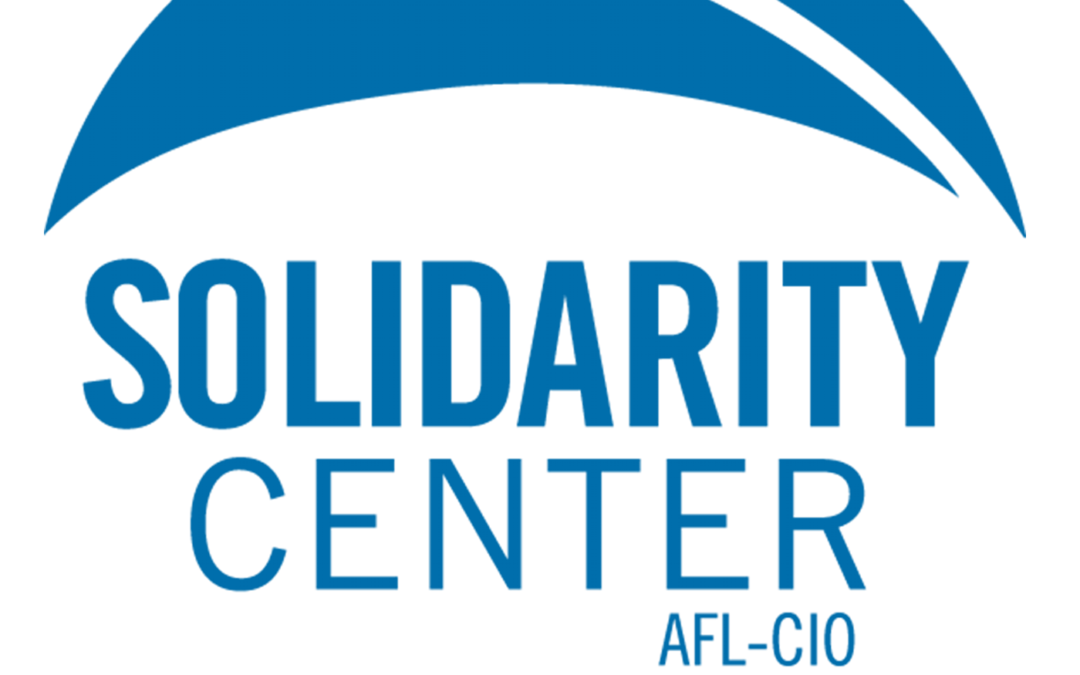
May 5, 2021
The Solidarity Center is honored to announce that two dynamic leaders from within the U.S. labor movement have joined its Board of Trustees.
The new members are Gabrielle Carteris, president of the Screen Actors Guild-American Federation of Television and Radio Artists (SAG-AFTRA) and Alvina Yeh, Executive Director of the Asian Pacific American Labor Alliance (APALA). They will join current Board of Trustees members guiding the Solidarity Center as it strives to empower workers to raise their voice for dignity on the job, justice in their communities and greater equality in the global economy.

SAG-AFTRA President Gabrielle Carteris. Credit: SAG-AFTRA
Gabrielle Carteris became SAG-AFTRA president in 2016, after serving two terms as executive vice president. She became a household name playing Andrea Zuckerman on Beverly Hills, 90210 and recently starred in BH90210, a revival of the iconic show. Her extensive resume includes work in television, film and the stage, with recent credits including a recurring role on Code Black and guest-starring roles on Criminal Minds, Make It or Break It, The Event, Longmire and The Middle. As a producer, Carteris created Lifestories, a series of specials, and Gabrielle, a talk show that she also hosted. In her role as SAG-AFTRA president, Carteris chairs the National TV/Theatrical Contracts Negotiating Committee and leads the President’s Task Force on Education, Outreach and Engagement. She represents SAG-AFTRA with the International Federation of Actors (FIA), where she works to bring actors together across borders.

APALA Executive Director Alvina Yeh. Credit: APALA
APALA Executive Director Alvina Yeh. Credit: APALAAlvina Yeh serves as the Executive Director of the Asian Pacific American Labor Alliance (APALA) and Institute for Asian Pacific American Leadership & Advancement (IAPALA). Originally from Colorado, she comes from a Chinese family who fled from the war in Vietnam. Alvina, a lifelong community organizer with experience in electoral and issue-based campaigns, has a career committed to social justice. She is deeply passionate about building a movement where everyone has a fair shot in a thriving society, and brings an international lens on human and worker rights to the work of APALA. Yeh currently serves as the Co-Chair of the National Council of Asian Pacific Americans (NCAPA) and serves the Congressional Progressive Caucus Center Advisory Board and the National Korean American Service & Education Consortium Action Fund (NAKASEC AF) Board.
“I am thrilled that President Carteris and Executive Director Yeh are joining our Board,” said Richard L. Trumka, president of the AFL-CIO and chair of the Solidarity Center Board of Trustees. “They bring important and diverse points of view and a deep commitment to the Solidarity Center’s mission to support worker rights around the world, for everyone. We look forward to their contributions.”
Shawna Bader-Blau, executive director of the Solidarity Center said: “The Solidarity Center is dedicated to building cross-movement relationships and strengthening the connections between workers in the United States and workers around the world. So we are excited to begin work with these two labor leaders who bring a passionate interest in worker rights, additional connections to the U.S. labor movement and a wealth of experience in organizing, international solidarity and power building for workers in the United States and beyond.”
The Solidarity Center is the largest U.S.-based international worker rights organization helping workers attain safe and healthy workplaces, family-supporting wages, dignity on the job, widespread democracy and greater equity at work and in their community. Allied with the AFL-CIO, the Solidarity Center assists workers across the globe as, together, they fight discrimination, exploitation and the systems that entrench poverty—to achieve shared prosperity in the global economy.
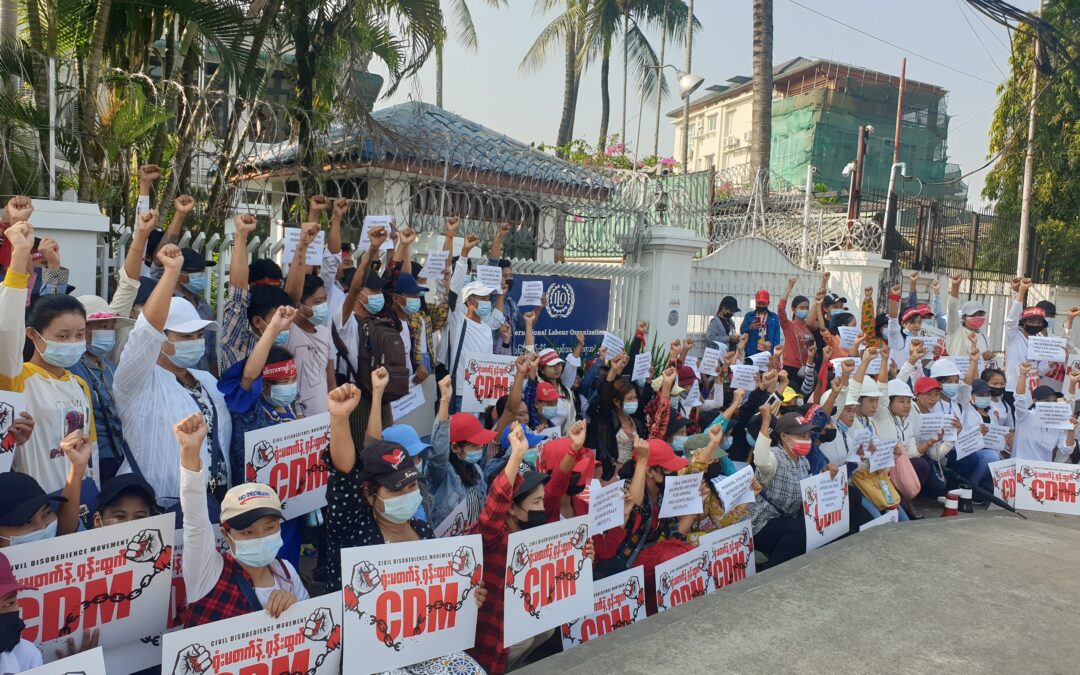
Apr 29, 2021
Two union leaders in Myanmar recently have been arrested for their participation in pro-democracy rallies, and unions worldwide are calling for governments to halt trade and other financial support that provide backing to the country’s military government. The total number of union leaders arrested since the February 1 military coup is at least 20, according to union leaders. (Support workers under attack in Myanmar.)
More than 750 people, including more than dozen union members, have been killed and at least 3,400 people arrested. Union members killed include Chan Myae Kyaw, a union activist and truck driver at a copper mine, who was shot dead while protecting other protestors during a peaceful rally.
Ma Myo Aye, leader of the Solidarity Trade Union Movement (STUM), was arrested at the union’s office in Yangon in recent days and taken to prison by the military. Union leaders say she is charged for allegedly violating Section 505a of the Penal Code, which makes it a crime to cause or intend to cause disobedience or disloyalty to members of the government. Her first court hearing is scheduled for April 29.
She has been transferred to Insein prison in Yangon, which union leaders say is notorious for its torture of prisoners. Myanmar media is reporting horrific sexual assault and other forms of torture against women imprisoned by the military.
Mi Aung, the finance officer of the Hmawbe Brick Factory Union, an affiliate of the Building and Wood Workers Federation of Myanmar (BWFM), was arrested by the army in Hmawbe, where she was visiting her family. Her whereabouts are unknown. The union is vowing to carry on the struggle for democratic freedoms.
The two leaders are among tens of thousands of union members who have taken a leading role in the nationwide Civil Disobedience Movement (CDM) to peacefully protest for an end to the military coup. Union offices have been ransacked and the military has conducted door-to-door searches for union activists, most of whom have now gone into hiding outside Yangon. Arrest warrants have been issued for at least 75 union leaders.
Military Harassing Garment Workers, Union Activists Fired
Garment workers–women in particular–have taken a leading role in the protests, with the country’s 450,000 garment workers especially active in organizing civil disobedience actions and shutting down factories.
In Hlaing Thar Yar, an industrial zone outside Yangon, factories are re-opening despite the dangers to workers. The Industrial Workers’ Federation of Myanmar (IWFM) says the military is arbitrarily stopping workers on the streets, demanding they give their phones to soldiers or face arrest. If they do not have phones, the military requires them to pay a fine. During CDM rallies, the military has killed more than 100 workers in the area, burning some alive, and factories also have been burned, according to the federation.
Yet if workers do not return to their jobs, IWFM says factory management is using their absence to lay off union representatives. Because the military regime cut phone lines and internet access, workers are unable to tell their employers they cannot return to work, and so lose their severance pay.
Unions Worldwide Demand Immediate Action
IWFM and the Federation of General Workers-Myanmar are asking multinational fashion brands to ensure workers can take unpaid leave if they request it because of the lack of safety, and to enable participation in peaceful pro-democracy demonstrations.
Unions around the world are pushing their governments to take immediate action by isolating the military junta and impose sanctions on the Myanmar Oil and Gas Enterprise (MOGE), which provides the military with crucial financing.
The global union movement also is urging international financial institutions to recall all projects and loans to the military government, and initiate dialogue with the National Unity Government, which includes leader Aung San Suu Kyi, who was among elected officials the military arrested.
A coalition of global union federations issued a statement conditionally supporting the Five Point Consensus statement by the Association of Southeast Asian Nations (ASEAN) in which the organization and Myanmar’s junta agreed to a plan to end violence and hold a constructive dialogue among all parties.
While ASEAN’s plan is a good, partial step forward, the union federations say, it omits key concerns.
“A dialogue process will be meaningless if political leaders remain imprisoned and if trade unionists, activists and even health workers who assist the injured, remain at risk of arrest, torture and imprisonment,” the union federations say. “Trade unionists have been arrested, tortured and harassed in door-to-door searches, while others are hiding in fear. The military has imposed widespread restrictions on workers’ rights and curtailed freedoms of speech and assembly, blocked social media and declared 16 labor-related organizations illegal.”
Education International is urging the United Nations Security Council to take stronger action, including targeting military leaders, and asks national governments to use all means available to sanction the military, including through economic pressure.
IndustriALL global union is calling on companies to end commercial ties with the military and urging its affiliates to pressure governments to impose economic sanctions
In New Zealand, the Council of Trade Unions is pushing its government to not ratify the Regional Comprehensive Economic Partnership (RCEP) trade agreement because it includes trade with Myanmar. The Swedish union of forestry, wood and graphical workers called on the country’s Forest Stewardship Council to stop providing certifications to raw materials exported by Myanmar’s military junta.







